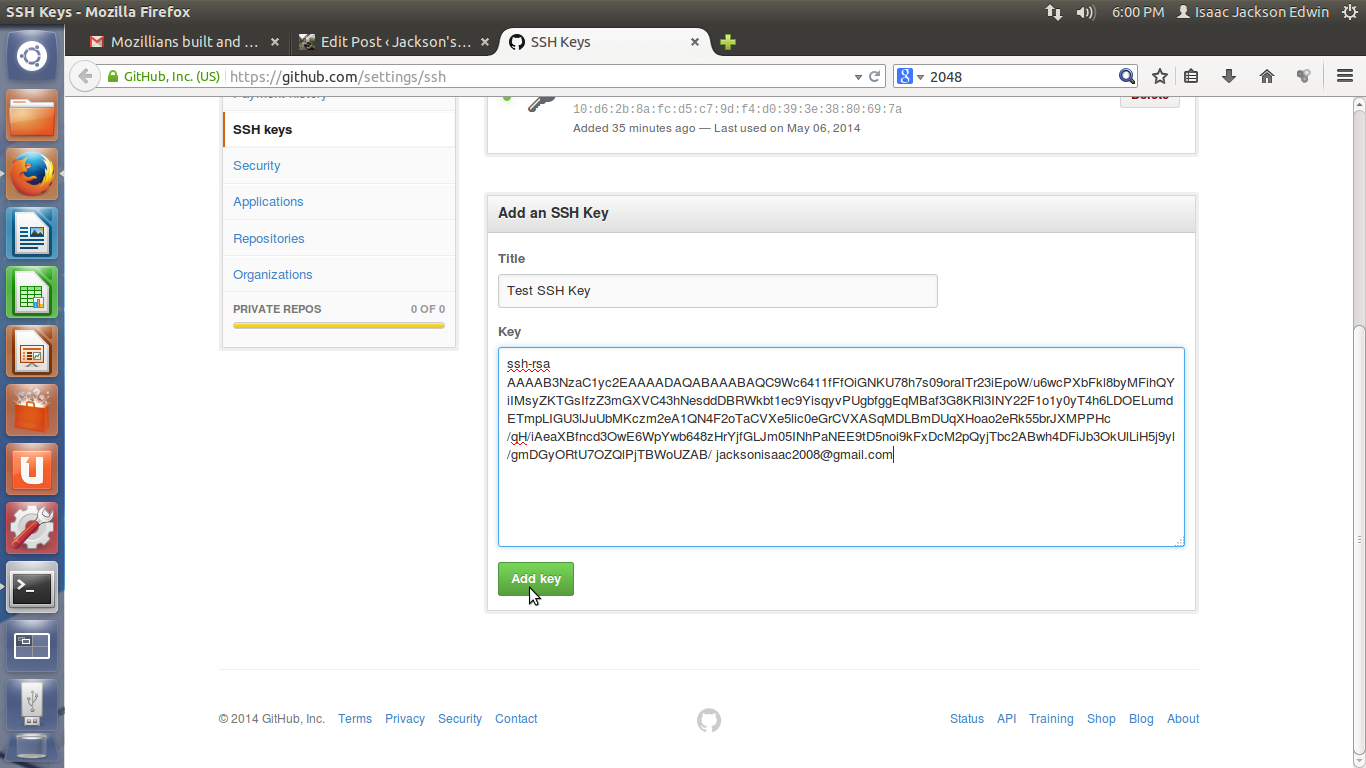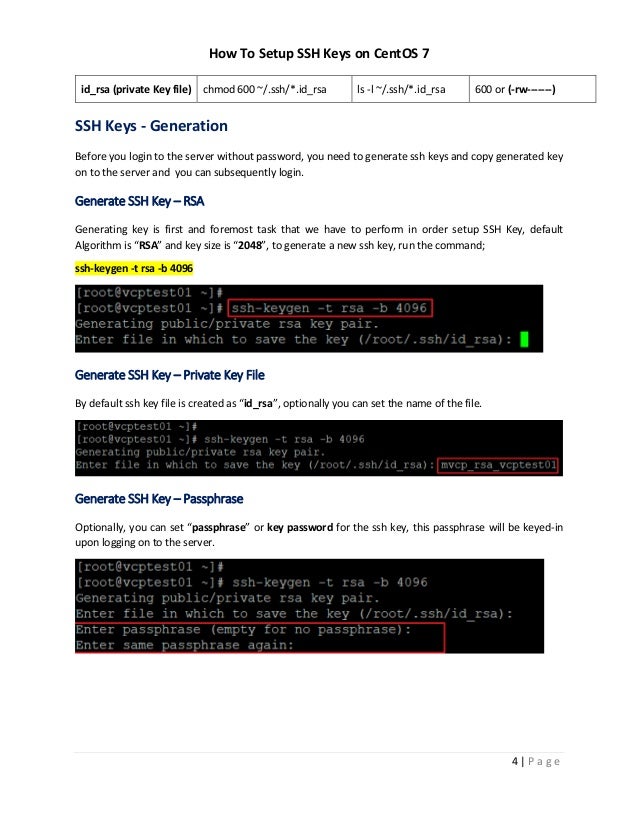Generate And Add Ssh Key To Github
Aug 13, 2019 Using an SSH key is a convenient and secure way to access your account. It’s convenient because you don’t need to remember a long password. And you can make your actual password so brutally long and secure that no human or bot could guess it. The SSH key works like an actual key that only you possess. How to Create an SSH Key. Mar 14, 2018 With SSH keys, you can connect to GitHub without supplying your username or password at each visit. You can now use ssh to clone the repo and initialize all submodules. Generate a ssh key. Ssh-keygen -t rsa -b 4096 -C 'youremail@example.com' Adding your SSH key to the ssh-agent. Start the ssh-agent in the background. Eval '$(ssh-agent -s)' Add.
- Generate And Add Ssh Key To Github Download
- Generate And Add Ssh Key To Github File
- Generate Ssh Key Windows Github
SSH keys are a way to identify trusted computers, without involving passwords. The steps below will walk you through generating an SSH key and adding the public key to the server.

Step 1: Check for SSH Keys
First, check for existing SSH keys on your computer. Open Git Bash, Cygwin, or Terminal, etc. and enter:

- GitLab and SSH keys. Git is a distributed version control system, which means you can work locally. In addition, you can also share or “push” your changes to other servers. GitLab supports secure communication between Git and its servers using SSH keys.
- It's a harder problem if you need to use SSH at build time. For example if you're using git clone, or in my case pip and npm to download from a private repository. The solution I found is to add your keys using the -build-arg flag. Then you can use the new experimental -squash command (added 1.13) to merge the layers so that the keys are no longer available after removal.
- Create and add your SSH public key. It is best practice to use Git over SSH instead of Git over HTTP. In order to use SSH, you will need to: Create an SSH key pair on your local computer. Add the key to GitLab. Go to your command line. Follow the instructions to generate your SSH key pair.
- Add Your SSH Key to Pantheon. Log in to Pantheon and go to the Account tab in your User Dashboard. Click SSH Keys. Paste the copied public key into the box, and click Add Key. Your computer is now set up to securely connect to the Pantheon Git server.
- May 13, 2016 I show you how to generate SSH keys and add them to Github so you no longer have to enter you password each time you push. Create and Add your SSH key to GitLab - Duration: 1:11.
Check the directory listing to see if you already have a public SSH key. By default, the filenames of the public keys are one of the following:
- id_dsa.pub
- is_ecdsa.pub
- id_ed25519.pub
- id_rsa.pub
If you see an existing public and private key pair listed (for example id_rsa.pub and id_rsa) that you’d like to use, you can skip Step 2 and go straight to Step 3.
Step 2: Generate a new SSH key
With your command line tool still open, enter the text shown below. Make sure you substitute in your email address:
You’ll be asked to enter a passphrase, or simply press Enter to not enter a passphrase:
After you enter a passphrase (or just press Enter twice), review the fingerprint, or ‘id’ of your SSH key:
Users need to use the following command: ssh-keygen -o -b 4096 -t rsaThe above command kicks off the SSH Key installation process for users.  Installation of SSH Keys on Linux - A Step-By-Step GuideOutlined below is a step-by-step guide detailing the process of installing SSH Keys on a Linux server: Step One: Creation of the RSA Key PairThe first step in the installation process is to create the key pair on the client machine, which would, more often than not, be your own system.
Installation of SSH Keys on Linux - A Step-By-Step GuideOutlined below is a step-by-step guide detailing the process of installing SSH Keys on a Linux server: Step One: Creation of the RSA Key PairThe first step in the installation process is to create the key pair on the client machine, which would, more often than not, be your own system.
Step 3: Add your key to the ssh-agent
Generate And Add Ssh Key To Github Download
To configure the ssh-agent program to use your SSH key, first ensure ssh-agent is enabled.
If you are using Git Bash, turn on the ssh-agent with command shown below instead:
Then, add your SSH key to the ssh-agent:
Step 4: Add your SSH key to the server
To add your public SSH key to the server, you’ll copy the public SSH key you just created to the server. Substitute “username” with your username on the server, and “server.address.com” with the domain address or IP address of your server:
The server will then prompt you for your password:
That’s it! You should now be set up to connect to the server without having to authenticate.
SSH keys are an access credential used in SSH protocol (Secure Shell) which is a network protocol that helps to login from one computer to another securely, as well as to manage networks, operating systems, and configurations. This snippet is going to help you add an SSH key to the ssh-agent, generate a new SSH key, learn how to find the SSH key of your PC and how to connect it with your GitHub/bitbucket account. You can also find information on the use of SSH keys.
Generate And Add Ssh Key To Github File
Now let's find out how we can checkout PC's SSH keys.
Checking PC's SSH Keys
Type ls -al ~/.ssh so as to see your ssh keys:
By default, the filenames of the public keys are one of the following:
Generate a new SSH key
Type this below, using your GitHub's account email:
The following text will show up after which you can hit the “Enter” button:
In this section, you can hit “Enter” again or type the secure passphrase (more about passphrase). Windows 7 ultimate key generator 2015 download.
Adding an SSH key to the ssh-agent
Now let’s find out how we can add the SSH key to ssh-agent. Before adding, check your ssh keys or generate a new key.
- Be sure ssh-agent is enabled:
- Add your SSH key to the ssh-agent. If you used an existing SSH key rather than generating a new SSH key, you would need to replace id_rsa in the command with the name of your existing private key file:
How To Add SSH Key To Github Account
- Log into your Github's account. In the top right corner of any page, click your profile photo, then click Settings.
- In the user settings sidebar, go to SSH and GPG keys.
- Click New SSH key.
- Type Title and your SSH Key.
You can get your ssh key by typing below.
Now you have added your PC's SSH key to your Github's account.
Back up old SSH keys
If there are existing SSH keys, but you do not want to use them for connecting to Bitbucket Server, you should back up these old keys running the following:
Why we need SSH key (for Linux and OSX)
If you use Git and want to clone anything from remote repositories, you have to choose one of these two ways: HTTPS or SSH. If you use HTTPS, you have to type your account access every time you communicate with the remote repository, or change your configs and fill your account data (access). Another modern way is to use the SSH authentication method. It is used in many Version Control Systems to have command line access into your servers, etc. SSH key pairs can be used for authentication instead of passwords. Each key pair consists of a private key and a corresponding public key. When you use SSH key for Git, you inform Git that this PC is authenticated for that Github account, and it will never ask you about any access again because you have already given it your SSH key.